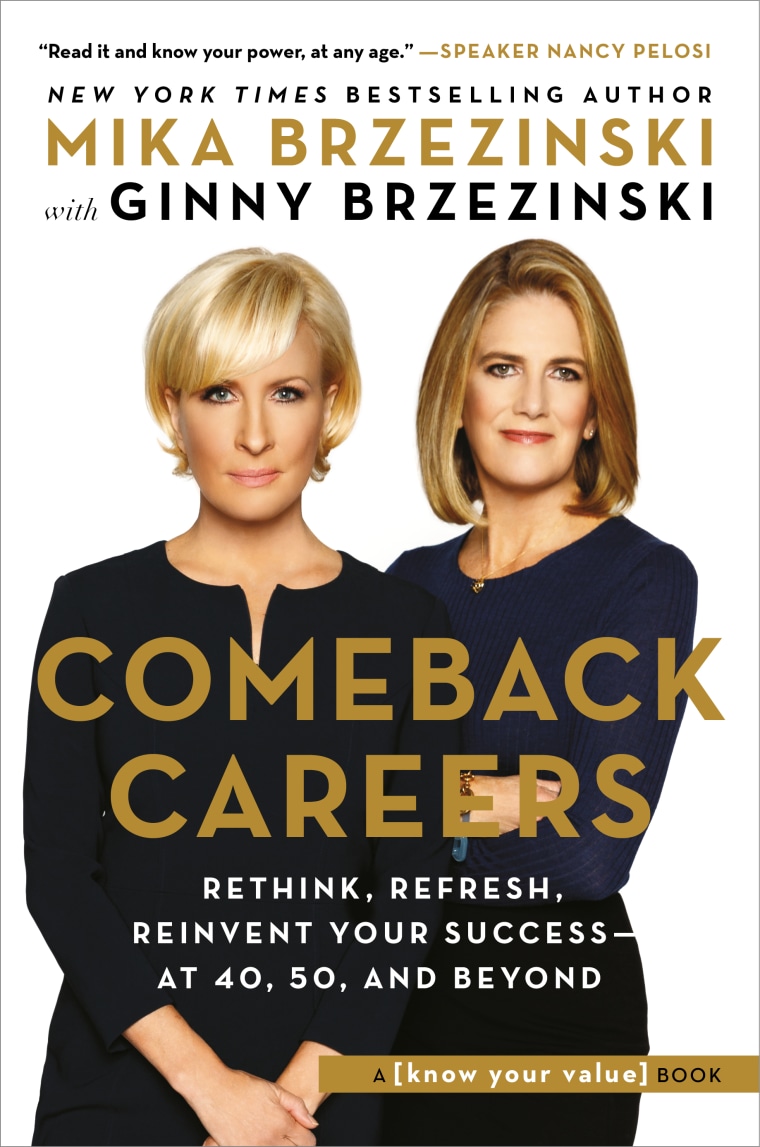“Owning your story” is a concept that many women struggle with, especially if they took a few years away from the paid workforce to raise kids or to take care of an aging parent or ailing spouse.
Here’s the $64,000 question: How do you own — and sell — that story to a potential employer?
It was a question I had trouble answering, and an issue Mika Brzezinski and I explore in our new book, "Comeback Careers: Rethink, Refresh and Reinvent Your Success — At 40, 50, and Beyond." After all, being a stay-at-home parent in a “What-do-you-do?” city like Washington D.C. will end nearly every conversation at a power party faster than saying you’ve been diagnosed with the coronavirus. And as if small talk at cocktail parties isn’t hard enough, how do you “own” a multi-year career break in a cover letter, interview, resume or LinkedIn profile?
Here’s how:
1. Be upfront about your time off.
If you’re crafting your cover letter or you’re in an interview situation, “state the facts, don't apologize and move on to why you are the best person for the job." said Carol Fishman Cohen, co-founder of career re-entry firm iRelaunch. Don’t joke about it or be embarrassed.
In cover letters and on your resume, don't leave any time unaccounted for, added Cohen. Don’t fudge it and don’t say things like “CEO of the Jones Household”. You may need to state outright that you took a career break for whatever reason from year x to year y. For example, “Career Break - for eldercare reasons.”
2. Find nuggets of experience and transferable skills you’ve earned during your career break.
If you did substantive volunteer work during your time “off,” took courses or did occasional consulting work, it's perfectly legitimate to list those as separate activities and not call them out specifically as a “career break,” said Cohen.
For example, if you did occasional consulting work, you could list “Jane Smith Consulting.” Just include a one-line description of the work, and three bullet points highlighting your top three engagements. "I’m a career re-launcher myself and on my own LinkedIn profile, you can see that I called six of my 11 years out of the workforce 'Community Leader' because of the volunteer work I was doing at that time," said Cohen.

3. Refresh your “story” by rebooting skills and updating knowledge
Your past professional experiences are valuable, but you may need to upskill if you’ve been on a career break. Identify what tech skills you may need to update, or certifications you may need.
You can find all kinds of free and low-cost classes on YouTube, Udemy or Coursera. Reboot your resume with a volunteer project that refreshes your skills. It will strengthen your “story,” give you something to talk about in interviews and expand your network.
4. Make your “story” valuable by connecting the dots for a potential employer.
Go back through your paid and unpaid experiences and find a way to show how your experience can help solve the organization’s challenges. “When you are in an interview, have an anecdote prepared for each of your prior work and volunteer experiences,” advised Cohen.
“You might say, 'I took a career break to care for my children and now I can't wait to get back to work. In fact, the reason I'm so excited about this particular opportunity, is that when I worked at Company X we faced very similar [customer/manufacturing/strategy] issues. Let me tell you about one....'"
5. Don’t undersell yourself, but be realistic.
If you have taken time off, the reality is that your value has changed and you may need to start in a much more junior position. Don’t let that deter you. Think of your first job back as a bridge or stepping stone. You will show your value and rise quickly.
You can find many more comeback career tips and strategies - including sample cover letters, email strategies, LinkedIn profile tutorials and how to answer tough interview questions - in Comeback Careers: Rethink, Refresh, Reinvent Your Success — At 40, 50, and Beyond.
